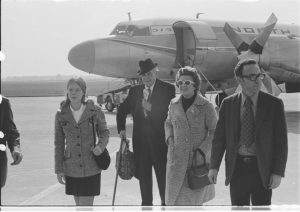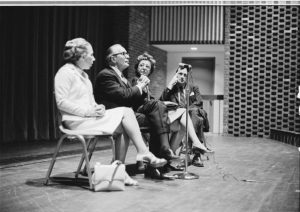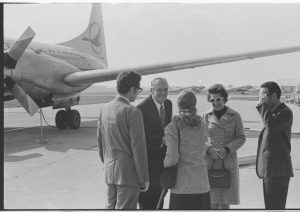Fredric March, have we misjudged you?
September 29, 2021

UW Oshkosh dedicated its newly constructed theater in actor Fredric March’s name in 1971.
Fredric March’s name has been disassociated from the UW-Madison and Oshkosh campuses after a piece of his past led to the removal of his name from Madison’s Fredric March Play Circle Theater in Memorial Union and UW Oshkosh’s Fredric March Theatre. Influential figures are now stepping forward saying both campuses made a mistake.
Who was Fredric March?
Fredric March, born Ernest Frederick McIntyre Bickel, was one of Hollywood’s most celebrated actors of the 1930s and 1940s. The Tony and Academy Award-winning best actor, born in Racine, Wisconsin, has been a popular name around campus for years on end.
March attended the UW-Madison, and started off working as a banker. A ruptured appendix leading to his near death helped him realize that life is short and pushed him to pursue his longtime dream of becoming an actor. After working as an extra in multiple movies, March eventually reached Broadway.
His health began failing in the early 1970s, and he died in 1975, just about four years after Oshkosh named its newly constructed theater in his honor.
Removal of March’s name from campuses
In August 2020, Chancellor Andrew Leavitt decided to remove the name of March from the Oshkosh campus theater, renaming the space the Theatre Arts Center.
The UWO decision followed a 2018 decision from UW-Madison to rename their Fredric March Play Circle Theater in Memorial Union as the Wisconsin Union Theater.
This controversy came after it was discovered that March belonged to a UW-Madison interfraternity society known as the Ku Klux Klan while a student in the 1920s. Although the club was called the Ku Klux Klan, there is no evidence that this group was affiliated with the notorious KKK from the South, known for their extreme violence and hate.
A story published in 1993 in the Wisconsin Magazine of History, a publication of the Wisconsin Historical Society, stated: “There is no evidence that the new organization was in any way tied to the better-known Invisible Empire of the Ku Klux Klan. But for four years the group prospered under the name Ku Klux Klan, and it made no attempt to distinguish itself from the Invisible Empire. Nor did the question of its affiliation ever become an issue for the university administration or the campus press.” But the story also reported the campus KKK, like some of the other fraternities at UW-Madison, dominated campus culture and monopolized campus politics, creating and growing a culture of intolerance and racism.
UWO’s forum on renaming the theater
UWO held an open forum in March 2019 regarding the renaming of the Fredric March Theatre that was led by then Associate Vice Chancellor Sylvia Carey-Butler because of her experience with diversity inclusiveness.

Actor Fredric March and his wife, the actress Florence Eldridge, arrive at the Oshkosh airport for the 1971 theater dedication.
At the forum, Carey-Butler said the naming of the theater dealt with March’s accomplishments as an actor, but may have not taken his personal affairs into consideration.
Alongside this open forum, a multi-racial student/faculty fact-finding committee later submitted a report to Leavitt with recommendations on the theater name.
The student and faculty committee polled students at the time and concluded that there was no clear preference among students whether to remove the March name from UWO’s theater or not.
The report stated: “To remove his name would betray ideals of critical thinking fundamental to UW Oshkosh’s educational mission. If UWO is to help students understand and properly contextualize the lives of public figures such as March, it needs to continue ratifying the importance of historical instruction within its general education sequence and degree requirements.”
Ultimately, the March name was stripped from the theater in August of 2020 after long debate. The UWO decision went against the strong recommendations of the committee that concluded that Fredric March was “ indeed on the right side of history” and that to remove Mr. March’s name “would betray ideals of critical thinking fundamental to UW Oshkosh’s education mission.”
Key people are now saying March’s reputation was tarnished without cause.
Letter to UWM and UWO seeks reconsideration
In a Sept. 17, 2021 opinion piece titled “The University of Wisconsin smears a once-treasured alum,” New York Times writer John McWhorter wrote “a group including alumni, faith leaders, actors and the NAACP wrote to University of Wisconsin officials asking them to repeal the tarring and feathering of an alumnus of the school, the renowned actor Fredric March.”
The letter, republished on the Oshkosh Examiner website and referenced above, was sent on Sept. 15 to nearly 40 individuals and departments associated with UW-Madison and UWO, and “criticized each school’s treatment of the legacy of acting legend Fredric March and asked them to reconsider their decisions to remove his name from campus facilities.”
Key signers of the letter included top officials of the NAACP, prominent historians and activists, Academy Award-winner Louis Gossett Jr., the late Ed Asner, descendants of March and others.
The letter detailed decisions to strip March’s name from the Madison and Oshkosh campuses, which the writers blamed on “social-media rumor and grievously fact-free, mistaken conclusions” about March.
March’s role in his college club was not dressing up as “some white-hooded Klansman” and terrorizing others, McWhorter wrote. “There is no evidence that his group was affiliated with the similarly named, but separate and notorious, KKK. Throughout, there was apparently little or no investigation of what the man actually stood for.” This little or no investigation led to conclusions being made on no solid facts, he wrote.
March’s contribution to racial equality and social justice

Actor Fredric March, his wife, actress Florence Eldridge, and others at the 1971 dedication of the newly constructed Fredric March Theatre.
According to McWhorter, March was a “lifelong ally of Black people,” and the statement is agreed upon by others, including those in the letter who said “he was a close ally of the NAACP upon whom the organization knew it could rely.”
Milwaukee journalist George Gonis has done a massive amount of study on March’s life and also helped to write the recent letter in support of March.
Gonis, having grown up in the 60s and 70s in a “Unitarian-Universalist civil-rights-marching family,” his parents, as great movie fans as they were, made sure he knew who in Hollywood stood on the right side of history.
“So when the Fredric March controversy first broke at Madison in August 2017, I knew generally that March’s detractors were quite wrong to characterize him as a white supremacist, and I assumed that eventually the truth would [come]out on campus, given the abundance of sources I knew existed about March’s unflagging dedication to fighting racial bigotry and anti-Semitism,” Gonis said. “Only it never did — not in any campus study, report or public hearing, and not in any campus, local or state press coverage of the controversy. And so I realized I had to start hitting libraries, museums and archives to do my own research and write my own article.”
After around two years of research including phone interviews with many of the nation’s leading, progressive civil rights historians, interviews with family and friends of those who actually knew March, he was able to produce a “long-form, photo-filled article” this past November in the online magazine BRIGHT LIGHTS FILM JOURNAL.
Gonis said that prior to the campus controversy starting, he had no idea just how dedicated March was to racial equality and other civil rights issues. While doing his prolonged study on March, he found almost “non-stop primary sources supplying example after example, statement after statement, event after event, all revealing March’s loud, enduring, ubiquitous mid-century presence in the fight for racial justice.”
He believes in the time from 2017 to now, students and others on campus simply did not know the whole story.
“They had no inkling that the actual Fredric March of history would no doubt be at the forefront of today’s continuing struggle for racial justice and understanding,” Gonis said. “And that’s a particularly searing irony.”
He said many progressive civil rights professors and historians in the past year have confirmed that there was close to zero national awareness or understanding in the 1910s of the original KKK. These same professors tell us the 1916-founded honor society March was a member of only seems to have gotten the name because during the era, male college honor societies sported “spectral, mysterious and ghostly names.” The organizers of the new honor society March came to be a member of were for some reason taken with the “ghostly appearance of the Reconstruction-era Klan while having no real understanding of or affinity for the terrifying hate-based actions and philosophies the Reconstruction-era Klan stood for.”
March was inducted into his honor society during his 1919-20 senior year. His induction was a surprise honor and he did not gain his membership through his own seeking, according to the Wisconsin Magazine of History.
The letter lists countless ways in which March was known for his stance on equality and civil rights. It states, in part: As a teen, he “delivered the same anti-white-supremacy speech given by Massachusetts high school senior Paul Robeson a few years later.” He “risked his massive box office in 1939 Jim Crow America by coming on board as one of the very few Hollywood stars unafraid to act as a primary sponsor of Marian Anderson and her historic Lincoln Memorial concert.” He “was asked by NAACP Executive Secretary Roy Wilkins in 1964 to deliver the keynote at the national 10th-anniversary celebration of Brown v. Board of Education.”
Family friend speaks out
Margaret Miner of Connecticut shared that the March family were friends of her parents since before she was born.
“If Freddy had a racist bone in his body, I don’t know where it would have been,” Miner said. “They were so well known, they believed in racial justice. We would say they were progressive, but adversaries would call them socialists.”
She noted how courageous the March family was for standing up for others who often were not taken seriously.
Miner hopes that the two Wisconsin universities will change their decisions and again honor March’s name. In fact, she said she hopes everyone can honor March’s memory as a good man who stood up for social justice and black performers.

Actor Fredric March and his wife, the actress Florence Eldridge, arrive at the Oshkosh airport for the 1971 theater dedication.
“The Marches stood out for being brave and not compromising their principles,” Miner said. “It would be nice if Mr. Leavitt acknowledged that Freddy didn’t deserve to have a theater named after him because he was a movie star, but rather because he was a very fine person.”
Should we reconsider our actions?
The letter from March supporters stated: “We fully support the legal and prompt removal anywhere of monuments, memorials and names of those who fought to defend the enslavement of human beings and of those who are on record belittling and dehumanizing any segment of a gloriously diverse human race as ‘less than.’ But with such intentions and decisions comes the weight of making sure you get your facts right.”
The letter also stated: “The actions of both UW-Madison and UW Oshkosh – again, coming from a place of high-mindedness – have resulted, unfortunately, in the careless and heartless demolition of Fredric March’s deserved good name across his alma mater, across Wisconsin, across social media and across the World Wide Web.”
Gonis said the “vast Fredric March Papers — filled with examples of March’s decades of commitment to racial equality — were located in the Wisconsin State Historical Society, just across the street from Memorial Union in Madison. Only no one ever took the time to walk that short 20 or 30 yards to delve into them.”
UW-Madison and UWO’s responses
The letter, reprinted in the Oshkosh Examiner, urges the return of March’s name to the theater, but both UWO and UW-Madison seem to be holding on to their past decisions and keeping March’s name from the campuses.
Peggy Breister, UWO spokeswoman and executive director of marketing and communications, said Leavitt has not changed his position regarding his decision on returning March’s name to the current theater. At the time of his decision, Leavitt said: “This is one more action we take to better reflect UWO’s commitment to making the institution a more just, inclusive and equitable place where everyone is unhindered in their experiences and journeys.”
While he acknowledged there is no evidence to show that the UW-Madison group March belonged to was linked to the national KKK, the “founders of the group … named their society to signal ‘an identification—or, at the very least, no meaningful discomfort—with the widely known violent actions of the Reconstruction-era Klan as it was remembered, celebrated and given new cultural and institutional life in the early 20th century.’”
Leavitt said: “I no longer possess—and this institution should reject—the privilege of nuancing explanations as to how a person even tangentially affiliated with an organization founded on hate has his name honorifically posted on a public building. Letting the Oshkosh campus theater’s name stand would also permanently overshadow and discount the educational and artistic virtuosity we work so hard to nurture within and beyond its walls.”
Breister also said Leavitt will respond to the family of Fredric March and those who wrote a letter asking for reconsideration of the decision.
In fact, a letter was sent late Tuesday and Gonis shared the chancellor’s response with the Advance-Titan.
“I very seriously considered Mr. March’s time, contributions and legacy,” Leavitt wrote in his letter. “I also took very seriously my responsibility to hear, understand and address the present-day concerns shared by UW Oshkosh students, alumni, colleagues and other stakeholders over the last few years. All of this informed my decision and statement.”
UW-Madison Chancellor Rebecca Blank also has not changed her mind on returning March’s name back to the campus.
She dismissed recent news coverage portraying students and administrators as “overly sensitive,” a reference to the recent New York Times opinion column.
Blank, in a New York Times letter to the editor, wrote that the removal of March’s name from the campus came after the terrible events of Charlottesville. “Historical research [was found] showing incontrovertibly that March was a member of a campus group called the Ku Klux Klan, though the group was not affiliated in any way with the national Knights of the KKK.”
She notes that as great as March was for continuing on in life as a “fighter for civil rights and equality,” it still remains a fact that he oriented himself with a “student group that echoed the KKK name.”
Blank said: “There are some things in our country’s history that are so toxic that you can never erase the stain, let alone merit a named space in our student union. Membership in a group with a name like that of the KKK is one of them.
“We believe that if we do not acknowledge both the good and the bad parts of our history,” she said. “We cannot construct a better present for current students, or future for the next generation.”













